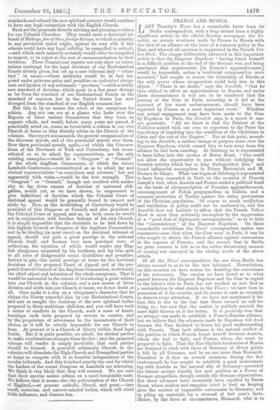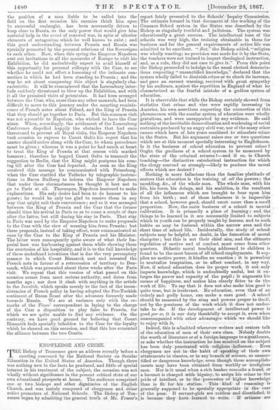FRANCE AND RUSSIA. L AST Tuesday's Times has a remarkable letter
from its Berlin correspondent, with a long extract from a highly significant article in the official Russian newspaper, the In- valide, on certain overtures made by France to Russia with the view of an alliance on the basis of a common policy in the East, and whereof all mention is suppressed in the French Yel- low Book. The charge deliberately advanced in this important article is that the Emperor Napoleon "having found himself in a difficult position at the end of the German war, and being convinced that acquiescence [in Prussia's aggrandizement] would be impossible, unless a territorial compensation were accorded," had sought to secure the friendship of Russia as the only power whose co-operation could help him in this object. "There is no doubt," says the Invalids, "that he then wished to effect an approximation to Russia, and under these circumstances it was not to be wondered that the journey of the Czar to Paris, occurring as it did at the moment of her worst embarrassment, should have been regarded by France as a most important event." Whether any actual engagement may have been made to the Czar by Napoleon in Paris, the Invalids says, is a secret it can- not penetrate. "All we know is that the Cabinet of the Tuileries united with our own to represent to the Porte the expediency of inquiring into the condition of the Christians in Crete and the rest of the Empire." But at this point, accord- ing to the Invalids, a sudden change of purpose came over the Emperor Napoleon, which caused him to turn away from the alliance he had been courting. At Salzburg he is represented to have fallen into the meshes of Baron Beust, "who could not allow the opportunity to pass without indulging the feverish activity which has so long distinguished him," and found influential accomplices in Prince Metternich and M. Drouyn de Lhuys. What was begun at Salzburg is represented to have been cemented in Paris on the occasion of Francis Joseph's visit, when Austria and France sealed a political bond on the basis of circumscription of Prussian aggrandizement, encouragement of Polish propagandism in Galicia, and a common protection of Turkey against the rising pretensions of the Christian population. Of course so much oscillation and vacillation in policy could not be confessed to, and the Invalids does not hesitate to affirm that the French Yellow Book is more than ordinarily incomplete by the suppression of a "good deal of diplomatic correspondence," so as to hide the "inconsistency" of the Emperor Napoleon. On these remarkable revelations the Times' correspondent makes two comments—one, that when the Czar went to Paris, it was he who sought to obtain the French alliance against concessions at the expense of Prussia ; and the second, that in Berlin no great concern is felt as to the rather threatening menace of coming war conveyed in the closing words of the above article.
Of all the Times' correspondents, the one from Berlin has always seemed to us to be the best informed. Nevertheless, on this occasion we have reason for doubting the correctness of his statements. The version we have heard as to what passed between the Emperor Napoleon and the Czar in regard to the latter's visit to Paris, has not reached us now first as a contradiction to what stands in the rims ; we have been in possession of it for months, and its source is such as certainly to deserve every attention. If we have not mentioned it be- fore, this is due to the fact that there seemed no call for doing so ; but now that the matter is publicly mooted, the more light thrown on it the better. It is perfectly true that an attempt was made to establish a Franco-Russian alliance, but we believe that the advances,made by Napoleon fell dead because the Czar declined to loosen his good understanding with Prussia. That tacit alliance is the natural outflow of the position in which Prussia found herself between Austria, whom she had to fight, and France, whom she must be prepared to fight. That the Pan-Slavistic tendencies of Russia are destined to clash with those of Germany at divers points is felt by all Germans, and by no one more than Bismarck. Therefore is it that on several occasions during the last twelvemonth he has sought to establish a good understand- ing with Austria as the natural ally of Germany—provided the former accepts frankly her new position as a Power of German sympathies, though outside the German organization. But these advances have invariably been repelled by Baron Bengt, whose restless and sanguine mind is bent on keeping alive the embers of impossible autonomies in Germany, and in piling up materials for a reversal of last year's facts. Hence, by the force of circumstances, Bismarck, who as in the position of a man liable to be called into the field on the first occasion his enemies think him open to successful onslaught, has been necessarily driven to keep close to Russia, as the only power that would give him material help in the event of renewed war, in spite of ulterior elements of antagonism which he well knows to exist ; and this good understanding between Prussia and Russia was specially promoted by the personal relations of the Sovereigns to each other. Now, when this spring the Emperor Napoleon sent out invitations to all the monarchs of Europe to visit his Exhibition, he did undoubtedly expect to avail himself of this opportunity for personal colloquy with the Czar, to see whether he could not effect a loosening of the intimate con- nection in which he had been standing to Prussia ; and the way he set about compassing this object is singularly cha- racteristic. It will be remembered that the Luxemburg inter- lude suddenly threatened to blow up the Exhibition, and with it all the promised visits of potentates. It had been arranged between the Czar, who, more than any other monarch, had been difficult to move to this journey under the smarting reminis- cence of French notes about Poland, and the King of Prussia that they should go together to Paris. But this common visit was not agreeable to Napoleon, who wished to have the Czar alone. When, accordingly, the settlement of the Luxemburg Conference dispelled happily the obstacles that had once threatened to prevent all Royal visits, the Emperor Napoleon took occasion to express to Count G-oltz his regret that his master should arrive along with the Czar, to whom precedence must be given ; whereas it was a point he had much at heart to treat the King of Prussia at that season with marked honours ; therefore he begged Count Goltz to transmit the suggestion to Berlin, that the King might postpone his com- ing till after the Czar had departed. As soon as the King received this message he communicated with Petersburg, when the Czar startled the Tuileries by telegraphic instruc- tions to Baron Budberg to inform the Emperor Napoleon that under these circumstances he thought it best not to go to Paris at all. Thereupon, Napoleon hastened to make explanations. His only desire had been to do honour to his guests ; he would be only too glad to receive them in any way that might suit their convenience ; and so it was arranged between the King of Prussia and the Czar that the former should time his arrival in Paris so as to come a couple of days after the latter, but still during his stay in Paris. That stay in Paris was used by the Emperor Napoleon to make proposals to the Czar with the view of weaning him from Prussia ; but these proposals, instead of taking effect, were communicated at once by the Czar to the King of Prussia and his Minister. The latter were consequently quite aware of what their Im- perial host was harbouring against them while showing them the courtesies of his hospitality, and it is to the full knowledge of these underhand intentions that is due the very peremptory manner in which Count Bismarck met and resented the French note in favour of a retrocession of territory to Den- mark, which was presented about three weeks after the Paris visit. We repeat that this version of what passed on this occasion comes from most serious authority, and dates from months ago ; nor does it clash with anything in the article in the Invalide, which speaks merely to the fact of the incon- sistencies of French policy in having adopted the Pro-Turkish sentiment of Baron Beast after the advances formerly made towards Russia. We are at variance only with the re- marks of the Times' correspondent in laying to the charge of the Czar a disposition to play false to Prussia, for which we are quite unable to find any evidence. On the contrary, we have good. ground for believing that Count Bismarck feeis specially beholden to the Czar for the loyalty which he showed on this occasion, and that this has cemented the alliance between the two Courts.































 Previous page
Previous page